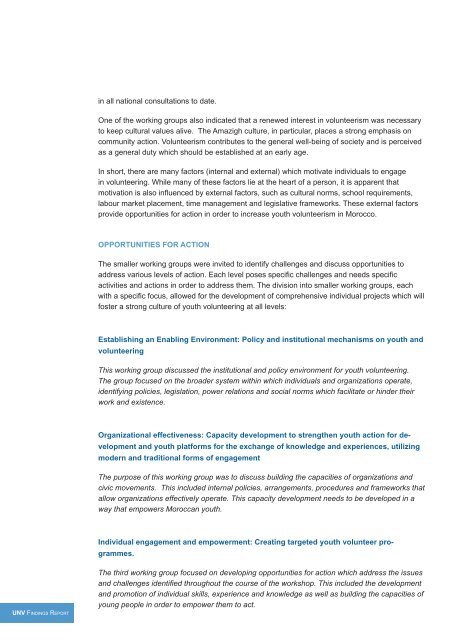J7rQWv
J7rQWv
J7rQWv
Create successful ePaper yourself
Turn your PDF publications into a flip-book with our unique Google optimized e-Paper software.
in all national consultations to date.<br />
One of the working groups also indicated that a renewed interest in volunteerism was necessary<br />
to keep cultural values alive. The Amazigh culture, in particular, places a strong emphasis on<br />
community action. Volunteerism contributes to the general well-being of society and is perceived<br />
as a general duty which should be established at an early age.<br />
In short, there are many factors (internal and external) which motivate individuals to engage<br />
in volunteering. While many of these factors lie at the heart of a person, it is apparent that<br />
motivation is also influenced by external factors, such as cultural norms, school requirements,<br />
labour market placement, time management and legislative frameworks. These external factors<br />
provide opportunities for action in order to increase youth volunteerism in Morocco.<br />
During the course of the first day’s discussions, the issues which were identified in the working<br />
groups were grouped into three main categories: Social/Cultural Issues, Infrastructure Issues and<br />
Economic Issues. These three main categories were relevant to all levels of the three working<br />
groups.<br />
Participants were encouraged to further discuss the identified opportunities for action, aimed at<br />
eliminating the barriers to volunteering for youth which had been identified in earlier sessions of<br />
the workshop. By using a “tree” model, participants were able to visualize these opportunities and<br />
develop basic conceptual elements of projects. Each group developed one tree for each crosscutting<br />
issue and presented its ideas in plenary at the end of the workshop. An example of the<br />
“tree” model can be found in Annex II.<br />
OPPORTUNITIES FOR ACTION<br />
The smaller working groups were invited to identify challenges and discuss opportunities to<br />
address various levels of action. Each level poses specific challenges and needs specific<br />
activities and actions in order to address them. The division into smaller working groups, each<br />
with a specific focus, allowed for the development of comprehensive individual projects which will<br />
foster a strong culture of youth volunteering at all levels:<br />
Establishing an Enabling Environment: Policy and institutional mechanisms on youth and<br />
volunteering<br />
This working group discussed the institutional and policy environment for youth volunteering.<br />
The group focused on the broader system within which individuals and organizations operate,<br />
identifying policies, legislation, power relations and social norms which facilitate or hinder their<br />
work and existence.<br />
Organizational effectiveness: Capacity development to strengthen youth action for development<br />
and youth platforms for the exchange of knowledge and experiences, utilizing<br />
modern and traditional forms of engagement<br />
The purpose of this working group was to discuss building the capacities of organizations and<br />
civic movements. This included internal policies, arrangements, procedures and frameworks that<br />
allow organizations effectively operate. This capacity development needs to be developed in a<br />
way that empowers Moroccan youth.<br />
Individual engagement and empowerment: Creating targeted youth volunteer programmes.<br />
SOCIAL AND CULTURAL INTERVENTIONS<br />
Participants were keen to highlight that a culture of volunteerism needs to start at an early<br />
age. Particularly in Morocco, it was felt that there is a certain level of “nostalgia” for cultural<br />
norms which have been diluted in recent years. Participants therefore indicated a need to<br />
reinvigorate those norms which embrace volunteering as a core value of society. At the same<br />
time, volunteerism is challenged by misperceptions that it does not instill responsibility or add any<br />
value to career growth, skill development and education. Therefore, participants proposed the<br />
following objectives to break down the cultural and social barriers in Morocco:<br />
Establishing a culture of volunteerism. Integrating creative, interactive initiatives in schools<br />
would include volunteer engagement. Furthermore, by increasing awareness about volunteerism,<br />
such as by celebrating national/international volunteer days and promoting voluntary efforts<br />
through channels such as Twitter and Facebook, the public and in particular youth, will be further<br />
encouraged to engage in voluntary activity.<br />
Increasing knowledge about volunteerism in Morocco. The integration of volunteerism into<br />
the curricula of academic institutions and promoting these as centers of excellence for knowledge<br />
generation, sharing and research will, according to participants, increase the knowledge of<br />
volunteerism and the importance of its role in the country. Additionally, Moroccan youth will be<br />
able to continue their commitment to volunteer efforts within established systems, rather than<br />
undertaking what they may perceive to be an additional burden. Reinforcing the role of higher<br />
education institutions in volunteerism will allow universities and secondary schools to play a<br />
key role by transferring students’ skills and capacities through civic engagement to developing<br />
projects and initiatives at local and national level.<br />
Engaging higher education institutions. Higher education institutions have an important role<br />
to play in the promotion of volunteerism amongst students. In addition, the research capacities<br />
of these institutions can greatly contribute to increasing the knowledge of the current socioeconomic<br />
and political situation in the country, as well as providing a space for youth to access<br />
information and opportunities to volunteer.<br />
UNV Findings Report<br />
The third working group focused on developing opportunities for action which address the issues<br />
and challenges identified throughout the course of the workshop. This included the development<br />
and promotion of individual skills, experience and knowledge as well as building the capacities of<br />
young people in order to empower them to act.<br />
Morocco 32


